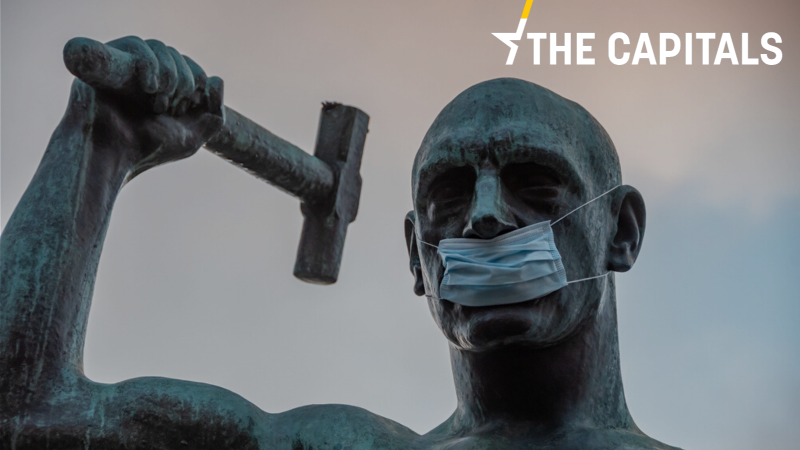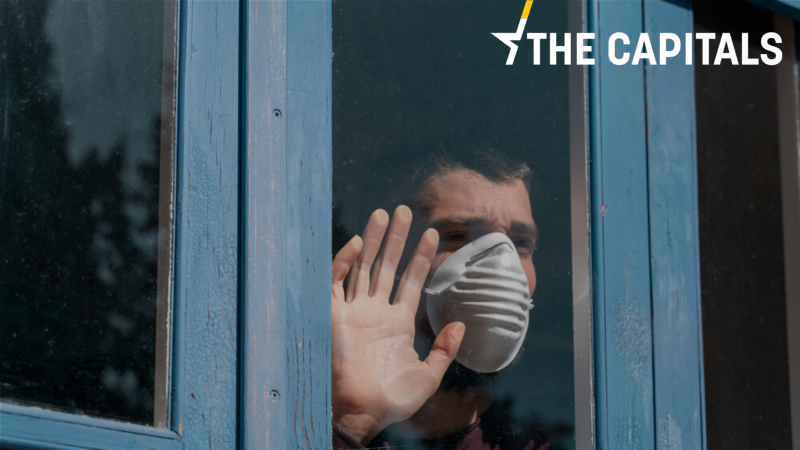
Before you start reading today’s edition of the Capitals, feel free to have a look at the article “Commission proposes shutting down EU’s external borders for 30 days” by Jorge Valero and Sarantis Michalopoulos.
Also, read the story “EU offers support to German vaccine company coveted by Trump” by Georgi Gotev.
To stay up-to-date on everything to do with the coronavirus across the capitals, feel free to check out EURACTIV’s comprehensive overview, which is regularly updated with the help of our network of offices and media partners.
///
DUBLIN. Ireland’s Health Service Executive has released guidance on taking care of your mental health, as workers across the continent adopt measures to self-isolate amid the coronavirus outbreak. EURACTIV’s Samuel Stolton takes a closer look at the situation.
///
BELFAST
Prioritising elderly in supermarkets. German supermarket chain Lidl has decided to give elderly consumers priority across all stores in Northern Ireland. “Starting March 17, the mornings will run from 9am – 11am every day and will include prioritised queuing and additional assistance for our older customers,” the company said in a statement.
“We ask that the public respect this time period to allow more vulnerable customers to pick up the food and supplies they need,” it added. (Sarantis Michalopoulos | EURACTIV.com)
///
LONDON
Johnson back to reality. Prime Minister Boris Johnson performed a dramatic U-turn on Monday and put the UK on lockdown to curb the spread of coronavirus, dropping his controversial ‘herd immunity’ approach and following the lead of continental Europe. Benjamin Fox reports from London.
BERLIN
Germany extending unified measures across all states. The government reached an agreement on Monday with all 16 regions on measures to mitigate the spread of the coronavirus, which Chancellor Angela Merkel announced that evening. EURACTIV Germany’s Sarah Lawton has more.
Also, keep up-to-date with EURACTIV Germany’s coronavirus coverage here.
///
PARIS
‘We are at war’. During a televised speech last night, French President Emmanuel Macron said that “we are at war” six times and that mobilisation of the government and the entire nation were required. Read the full story: ‘We are at war’: France postpones second round of elections, pension reform.
///
BRUSSELS
PM to address parliament. Prime Minister Sophie Wilmès (MR) will address the Belgian parliament to ask for support for a fully-fledged minority government on Tuesday (17 March) with a vote to follow on Thursday (19 March), after the coronavirus led to a small political breakthrough over the weekend. Alexandra Brzozowski looks at how this could influence further measures.
Read also: Belgium struggles to bridge differences amid coronavirus crisis
///
VIENNA
New measures as cases pass 1,000-threshold. While the number of reported cases had risen to 1,016 by Monday evening, the anti-coronavirus law passed by parliament the day before came into effect. EURACTIV Germany’s Philipp Grüll has more.
EUROPE’S SOUTH
ROME
EU should follow Italy’s way, says Italian PM. Yesterday, Italy’s government issued a €25 billion stimulus package with measures ranging from financial aid for troubling businesses to suspending tax payments for families. In presenting the plan, Italian Prime Minister Giuseppe Conte suggested other EU countries follow Italy’s model not only with regard to healthcare issues but also in the way they respond to the emergency as the country is putting forward an economic strategy. EURACTIV’s Gerardo Fortuna digs deeper.
///
MADRID
Closing its borders. As Spain became the fourth coronavirus hotspot in the world, the country on Monday announced the closure of its land borders at the stroke of midnight. Interior Minister Fernando Grande Marlaska said borders will only be open to Spaniards, residents and cross-border workers until the emergency is over. EURACTIV partner EFE has been reporting on the situation in Spain.
///
LISBON
First death. With 331 people infected, Portugal registered its first death on Monday. President Marcelo Rebelo de Sousa called a meeting of the Council of State to review the possibility of declaring a state of emergency. The meeting is to be held by videoconference on Wednesday.
Air traffic between Portugal and Spain was suspended on Monday afternoon, as well as rail links and the two river links, the Minister of the Interior announced. Portugal and Spain also limited movement on the common land border to goods and cross-border workers. (Lusa.pt)
///
ATHENS
Government shuts down churches. The Greek government decided to suspend operations in all areas of religious worship of any religion. Churches remain open only for individual prayer. “Protecting public health requires clear decisions,” Prime Minister Kyriakos Mitsotakis said. Read more about the issue here: Greek PM preaches science to Orthodox Church on coronavirus
Athens also announced yesterday that people who enter Greek territory will be put in a 14-day quarantine.
VISEGRAD
WARSAW
52 new cases. Poland now has 177 confirmed cases of coronavirus as of Monday with four deaths so far. Prime Minister Mateusz Morawiecki announced the suspension of domestic air travel, as well as the closing of borders, which was part of a government decision taken over the weekend. EURACTIV Poland’s Łukasz Gadzała has more.
///
BRATISLAVA
New government. The new Slovak government will be installed on Saturday (March 21). Outgoing Prime Minister Peter Pellegrini (Smer-SD) promised the transfer of power will be courteous and dignified. EURACTIV Slovakia’s Zuzana Gabrižová has the details.
///
PRAGUE
First three patients recovered. As of yesterday, Czechs are only allowed to go to work and to buy food. There are 383 reported cases of coronavirus and no deaths so far. The Health Ministry has reported that the first three patients have recovered from the virus. (Aneta Zachová | EURACTIV.cz)
///
BUDAPEST
Border lockdown. Hungary closed its borders at midnight last night. “Of course we will not break apart families,” said Tibor Lakatos, the chief of the coronavirus task force, clarifying that parents and spouses of Hungarian citizens with a resident permit or place of residence will be allowed to enter the country.
The government’s official website was offline for about two hours today due to a flood of requests that overloaded the website’s capacity. The Hungarian state’s official IT operator and the National Cyber Defense Institute are examining whether it was a deliberate act, said Lakatos. (Vlagyiszlav Makszimov | EURACTIV.com)
NEWS FROM THE BALKANS
SOFIA
Paying debts in times of crisis? Employers organisations insisted during a meeting with Bulgarian President Rumen Radev that the state should pay immediately all its pending debts to companies so that they could have fresh money during the COVID-19 crisis. EURACTIV Bulgaria’s Krassen Nikolov has the story.
///
ZAGREB
A new set of measures. The Croatian government is going to fine tune the final set of measures which are supposed to help the economy to mitigate the negative effects of the outbreak, which include legislative alterations on the national level, as well as individual adaptations in each of the government portfolios. Prime Minister Andrej Plenković announced that he will introduce 13 bills as soon as possible, which will be carried out in the five most relevant areas: finance, economy, agriculture, tourism and labour.
Meanwhile, as Croatian schools experienced their first cyberschool day, the Croatian Academic Research Network was hit by a cyberattack. However, Croatia was ready for the start of online classes amidst the epidemic and the education minister Blaženka Divjak announced that graduation exams will not be postponed for the time being. “School is functioning even in these difficult and extraordinary circumstances. It is a virtual school, but it does function,” she told the reporters during a visit to a Zagreb primary school. (Tea Trubić Macan, EURACTIV.hr)
///
BELGRADE
Serbia postpones parliamentary election. Serbia’s state electoral commission postponed on Monday the parliamentary election, due to be held on 26 April. As of Monday, there are 55 cases and the National reference laboratory of the Torlak Institute has tested 301 people who were deemed at risk. (EURACTIV.rs)
***
[Edited by Sarantis Michalopoulos, Daniel Eck, Sam Morgan]
EURACTIV's editorial content is independent from the views of our sponsors.





Za sudjelovanje u komentarima je potrebna prijava, odnosno registracija ako još nemaš korisnički profil....